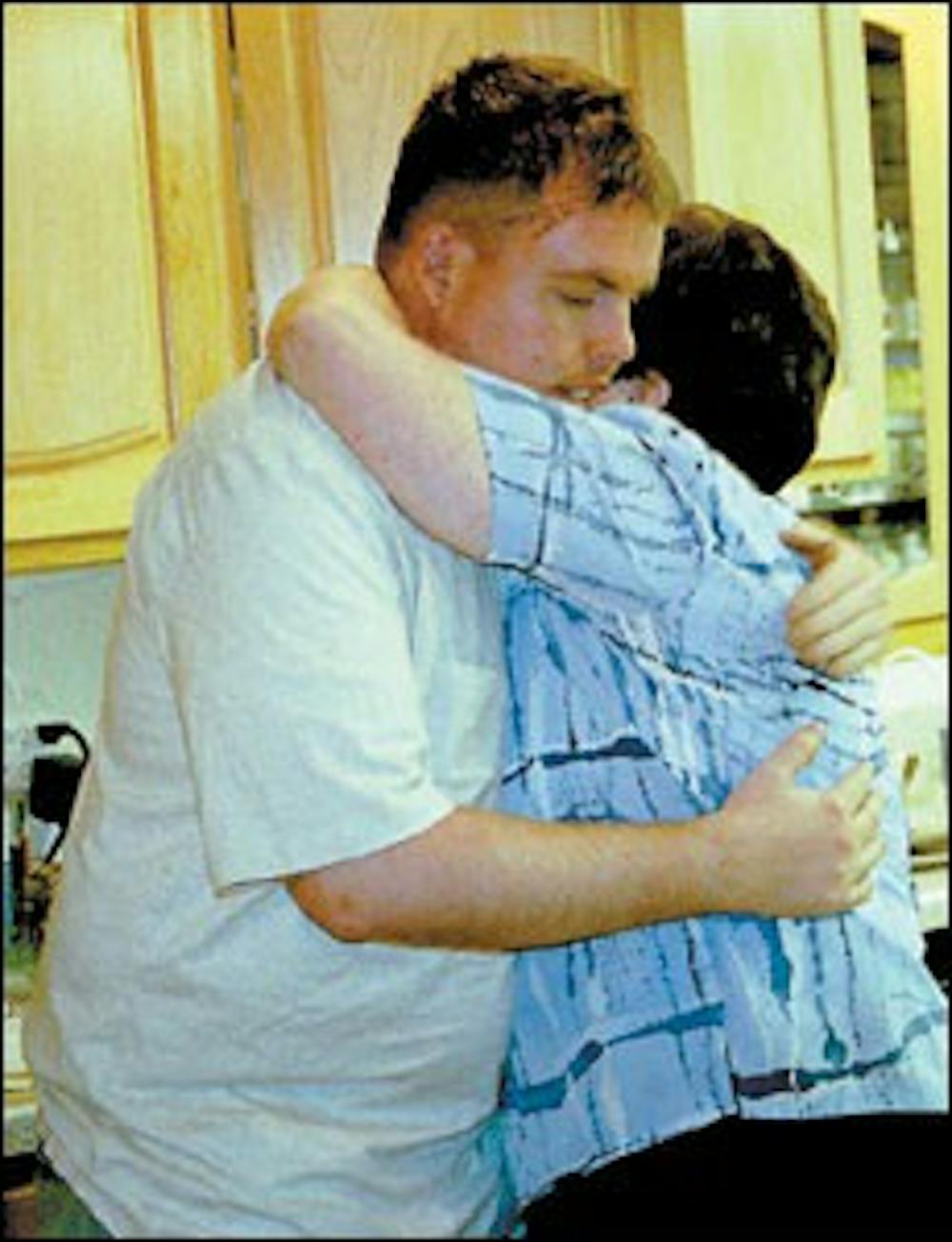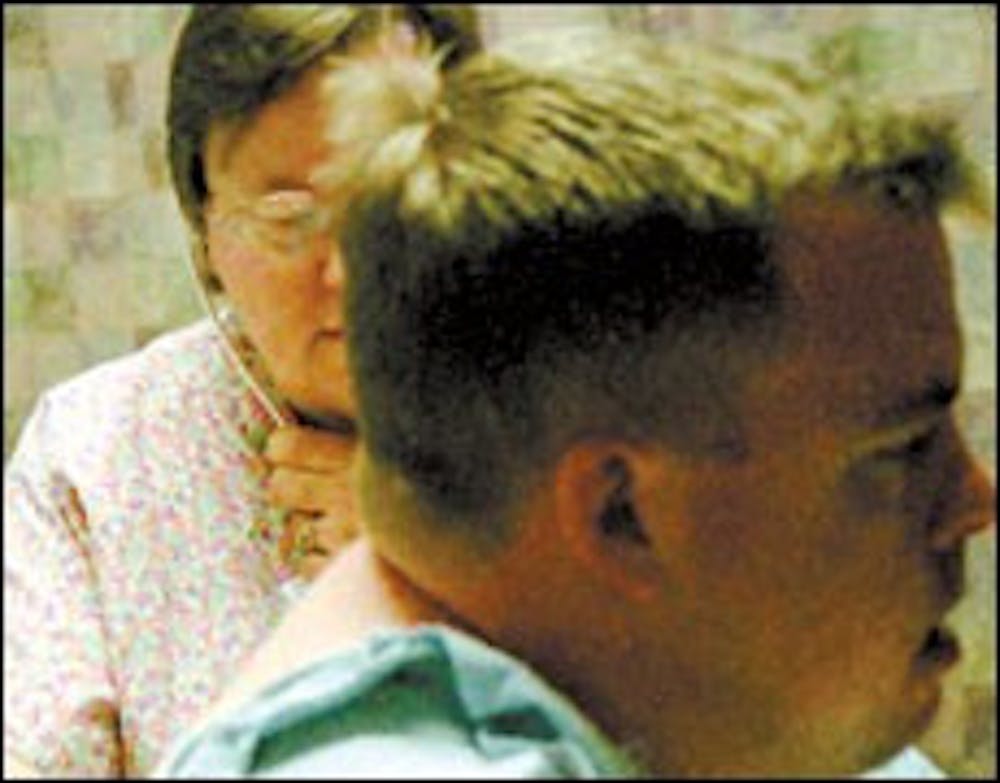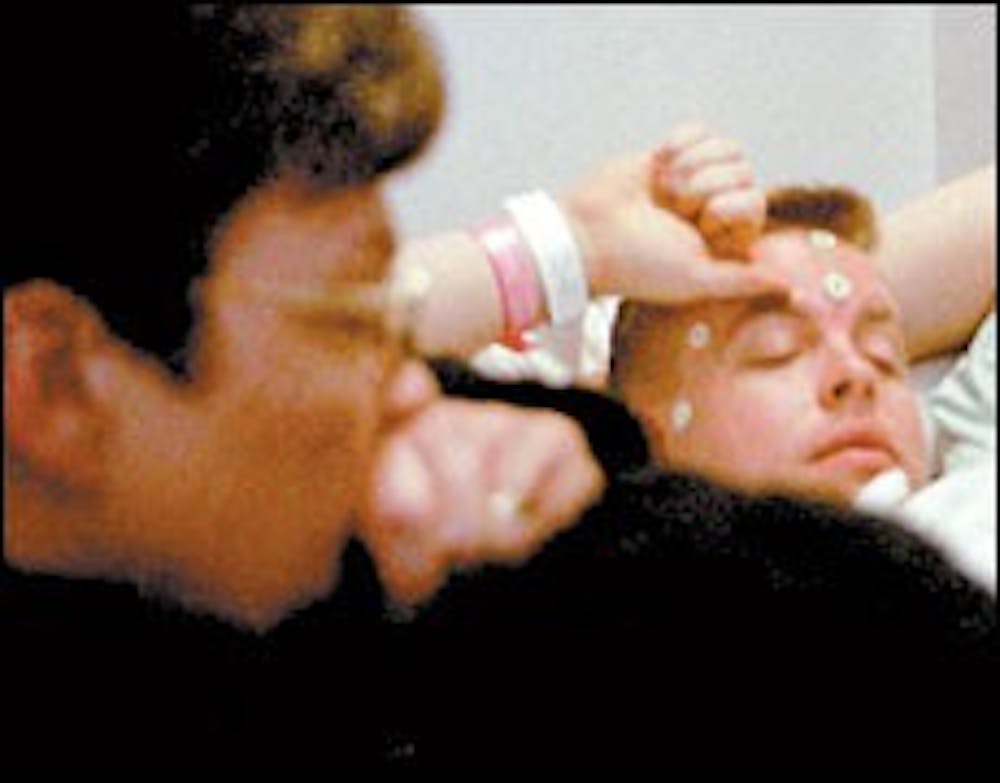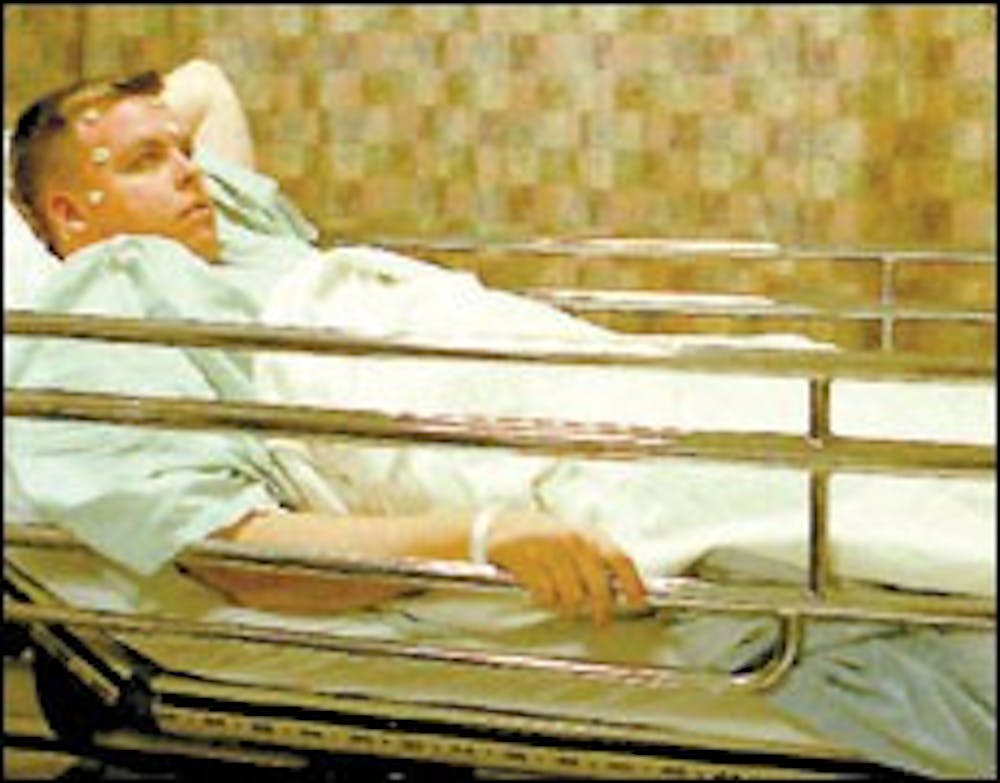It is a warm Wednesday afternoon at the end of March. Jeff Anderson is sweaty and tired from playing racquetball at the courts at Tempe High School. He stands about 5 feet 8 inches tall and is wearing loose workout shorts over his solid frame. His smile is contagious and freely given to his two opponents. There is a thin, shaved line in his sandy blond hair. It is the only sign anything has happened to him; no one would guess he had brain surgery last month.
"Don't get a picture of that," Anderson says as he misses the ball. A good-natured and calm 30-year-old, Anderson laughs as he misses the ball again and ends the game. Then he recalls a game in early January that didn't end as well.
- Story and photos by Samantha Xanthos
Three months ago, Jeff Anderson didn't know anything was wrong. Three classes away from graduating with a bachelor's in computer science, he could almost smell his diploma. Nothing could stop him from finishing, he thought.
He was wrong.
Anderson hit a bump-not a bump in the road; it was a bump in his head. What should have been one of the best times in his life quickly turned into one of the hardest. And it only took two words: brain tumor.
When he was first diagnosed, it wasn't just the tumor that invaded his mind, but fears and doubts crept in as well. Would everything be OK? Would he be the same person? Over the next couple of months, something unexpected, almost ironic, happened, and the life-threatening tumor became a light-giving blessing. Anderson changed his views on life.
He learned to depend on his family and friends-learned they would always support him. He also learned how important faith was to him in every experience. "Faith played a big part in this," he says.
Missing memory
It was Jan. 14. Winter break was almost over, and school was about to start again. Anderson was at Tempe High School, trying to get back into racquetball. Everything seemed to be fine. Everything was fine until, "I woke up to the EMT's," he says. "There is about 20 minutes from my life that are completely gone from my memory."
But those minutes are burned forever into the mind of Steve Thompson, Anderson's friend. Thompson played against Anderson that day at Tempe High School. About 45 minutes into the game, Thompson watched as Anderson started to stare off into the sky and slowly spin. At first Thompson thought it was a joke, then the spinning became faster and Anderson started to twitch and then fall. Quickly, Thompson caught him, and lowered him to the ground while he went into convulsions.
"It was a little scary," Thompson says. "I don't have any medical knowledge. I have never even seen a seizure before, and his lips were starting to turn blue."
Anderson's breathing was so irregular that Thompson was afraid it would stop all together. "I paused and prayed because I had no idea what to do, or where to go," he says. A few minutes later, Anderson started to regain consciousness. After he made sure Anderson was OK, Thompson ran to get his cell phone and call for help. Luckily, Tempe Saint Luke's Hospital is right next to Tempe High School; about 15 minutes after the seizure started, EMT's arrived at the scene.
Although worried about his friend, Thompson never thought the seizure was a symptom of a much larger problem. Even while Anderson was in the hospital it just "didn't sink in," Thompson says.
That night, Anderson stayed in the hospital. The doctors performed a CAT scan and found one side of his brain looked different than the other. The next day, they did a MRI and diagnosed Anderson with a slow-growing tumor in the right front lobe of his brain. Having grown for years, the tumor was about the size of a racquetball.
No one knows why the tumor suddenly affected Anderson at that day. He hadn't had headaches or any of the other symptoms of most brain tumors exhibit beforehand. Playing racquetball hadn't caused the seizure, but it might have saved him. If Anderson had been driving or alone, the results could have been much worse.
Gotta have faith
"We were shocked," Thompson says.
"A tumor didn't even enter our minds," says Juneve Anderson, Jeff's mother. They were even more upset when the doctor said recovery might take 10 to 12 months.
"We were scared he was going to have to learn how to do everything again, learn how to talk and walk again," she says.
But then a miracle happened. The family got some good news. The tumor was benign and operable, and possibly the best neurological center in the nation, if not the world, was close by. The Barrow Neurological Center is on the same campus as St. Luke's and is at St. Joseph's Hospital in Phoenix.
"There was a good reason I had (the brain tumor) here," Anderson says with a pause. His voice fills with conviction as he leans back a little in his seat. "If it had been anywhere else, it wouldn't have worked out."
Although a few miles away, it took two weeks to get Anderson admitted to the Barrow Neurological Center; the center didn't have enough beds. After two days at Tempe St. Luke's, he went back home to sit and wait.
But things changed for Anderson. Because of the seizure, Arizona law prohibited him from driving, and he still can't. Anderson also had to move back home, which was hard because of his independent nature. He also had take medical leave from his job developing education software at Mesa Community College. And of course, having to stop his last semester was frustrating, to say the least.
He wasn't alone though. As a member of the Church of Jesus Christ of Latter Day Saints, Anderson had many people were looking out for him. Other members of his church prayed and fasted for Anderson and his condition.
"It was like and instant network of my closest 150 friends all rooting for me. Now that's medicine you can't buy," Anderson says.
This medicine seemed to work. During those two weeks there was "a calm and peaceful feeling," say Barry and Juneve, Anderson's parents.
"My mom is a very faithful person," Anderson says. "She was calm for a reason. She was confident everything would work out." The family was also encouraged by Anderson's first visit with the surgeon, Dr. Smith, who assured the family everything would be fine. He thought Anderson would be out of the hospital in two to three days after the surgery with the recovery taking just a few months. "It's like drive-thru brain surgery," Anderson says.
Under the knife
The night before the surgery, Anderson was in an upbeat mood. At his house, Anderson and friends joked around. "I am going to walk in there, and give those doctors a piece of my mind," he says while laughing. At 4:30 a.m. on Monday, Feb. 2, he was on his way to do just that. The surgery was scheduled for 12:30 p.m. Time dragged. At 4:30 p.m., Anderson was finally on his way to the operating room.
"The only time I wasn't sure if I wanted this was when they were moving me from the hospital bed to the operating table," he says. "About 1 percent of me was afraid for my life. There is always the risk of something going wrong, but I was confident in Dr. Smith. He is the best in the world for what he does."
Anderson was more afraid of the results of the surgery. "What would I be like after it was over? How much pain would there be? Would I be the same person?" he says. His parents had the same worries.
"Would he still be our same Jeff?" Juneve asks.
The last thing he says he remembers was asking hospital staff if they were going to give him the "knock-out juice." Dr. Smith performed computer-assisted surgery on Jeff's brain using scans of the brain and the tumor placed on a screen. Three-and-a-half-hours later, a nurse moved Anderson out of the operating room. He was a little lighter than when he first entered the hospital.
"I have a splitting headache," Anderson tells visitors the next day. At least he hasn't lost his sense of humor. He was released from the hospital two days later, and he stopped using painkillers a week after that. But the road ahead is still long.
Bouncing back
Anderson is still the same person, but now he has a much shorter attention span. He blames the seizure for this. Before the surgery, he feared losing his ability to work in computers and music. They mean the world to him.
"I can still play the piano, I just can't sit for long periods of time," he says. Sometimes, he will even get distracted and walk away in the middle of conversations-although he knows that some people who have never had brain surgery do that. Soon, he will be weaned off his medication. In May, he will start to drive again, and in the fall, he will begin his last semester at ASU. Hopefully, he will finish it this time.
Although he had a brain tumor, Anderson thinks a million things went right for him. "I thought I would be in bed drooling for a month," he says. "Two months ago, the last thing I thought I would be doing is playing racquetball."
Thompson then goes one step further.
"If you are going to have a brain tumor," he says, "this is the best way to have it. So many factors were positive."
While these factors make his story incredible, Anderson's spirit makes his story remarkable. The tumor isn't the big issue, the struggle through the experience is. He lost part of his brain, but not his positive attitude. It taught him that enjoying life exceeds getting a degree. And that faith and family can get you through every situation.
"We think it was a blessing," Juneve says. "I believe faith is really important."
Barry says, "We're not doctors. We don't know medicine. Faith carried us through this. We rely on a power greater than us."
Juneve adds that the whole experience has shown her everyone faces challenges; they are not immune to them. She says now she has more compassion for people.
"It was a good life experience," Thompson says. "It brings out the things that are most important."
Anderson takes this to heart. He says, "In this life, there are good and bad choices, and some things we don't get to choose. Those things are what we usually learn the most from. I know I have learned and grown from this experience."
"It's just too bad it didn't enhance your ability to play racquetball," Thompson says jokingly.
Reach the reporter at samantha.xanthos@asu.edu.







